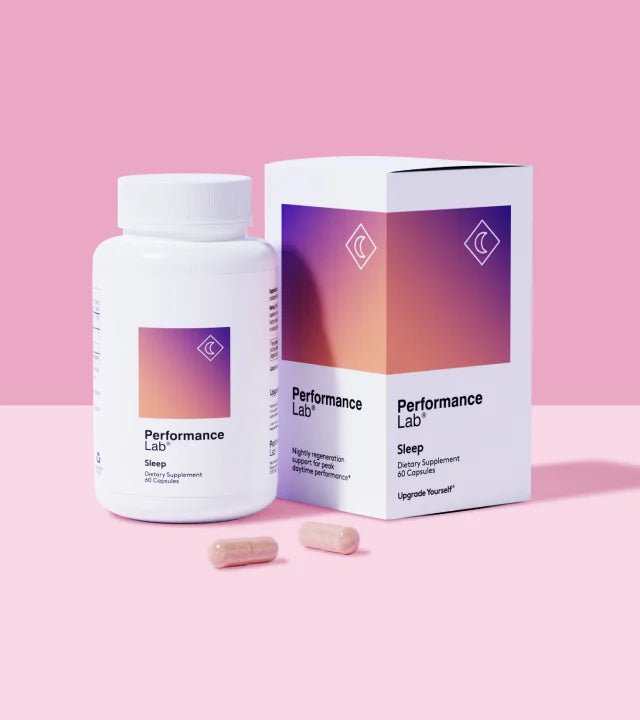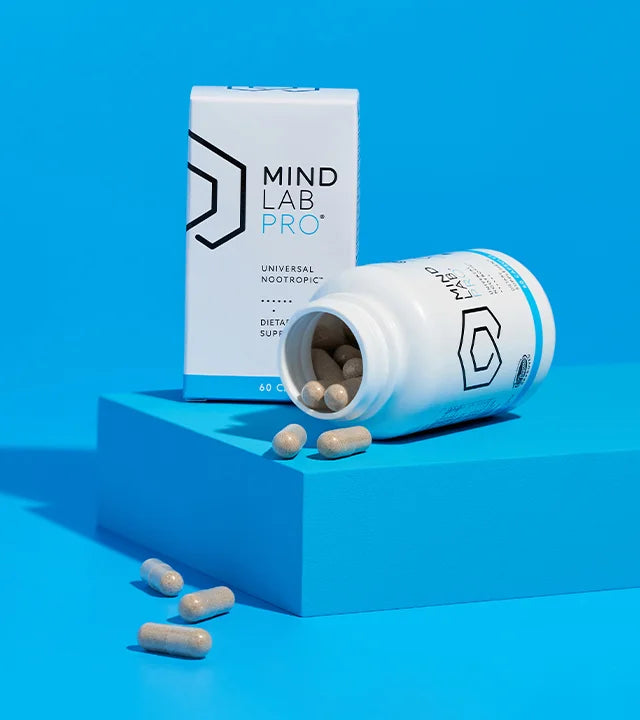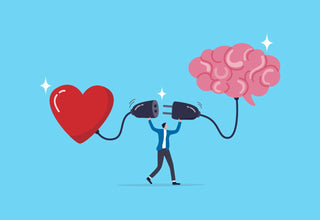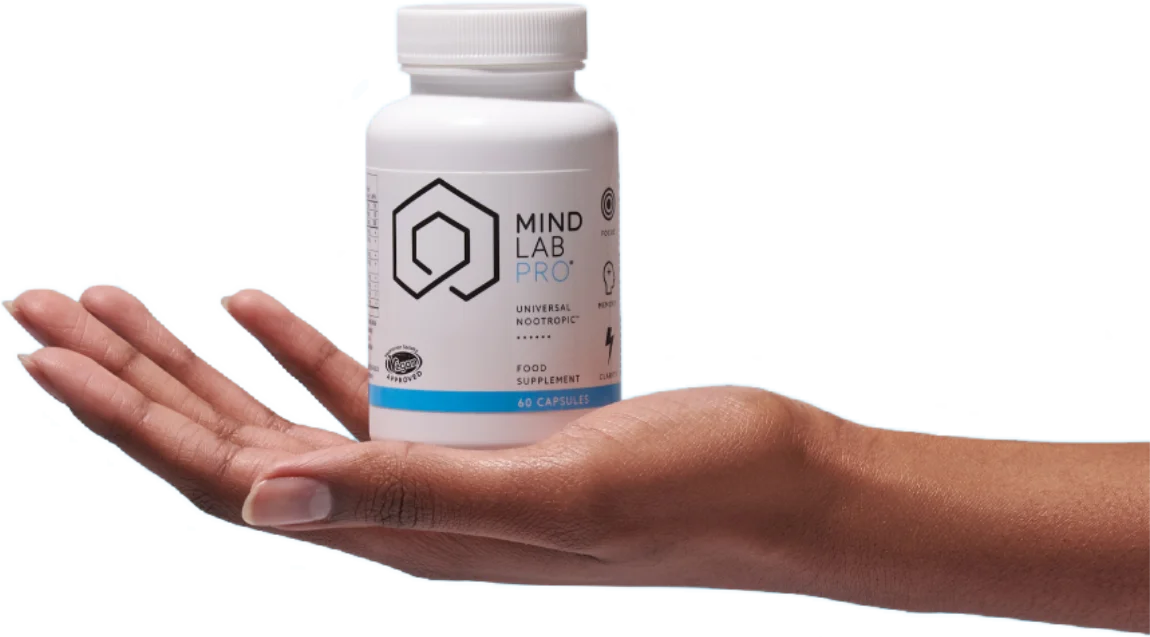Your brain changes every day -- and the most reliable way to protect it isn’t a hack, it’s a handful of repeatable habits. This Healthy Brain Blueprint distills the strongest evidence into four pillars: move your body, sleep on a schedule, eat a Mediterranean-leaning plate, and stay socially connected.
The quick wins below show the secrets to achieving optimal brain health -- including how to turn the science into simple, stackable routines you can start this week. Let's get to it!
Key Takeaways
- Exercise: Get 150-300 min/week moderate (or 75-150 vigorous) + 2+ days strength; boosts blood flow and BDNF for learning/memory.
- Sleep: Aim for 7-9 hours nightly with a steady schedule and a cool, dark room; supports memory consolidation and brain “clean-up.”
- Diet: Favor a Mediterranean pattern -- fish (omega-3s), EVOO, nuts/seeds, legumes, whole grains, colorful plants; limit ultra-processed foods, added sugar, and heavy alcohol; stay hydrated.
- Socialize: Schedule regular, meaningful contact (family meals, clubs, volunteering); mix close and casual ties to build cognitive reserve and buffer stress.
- Stack habits: Pair pillars for consistency (e.g., morning walk with a friend, cook a colorful dinner, power down screens before bed).
Your Brain is Your Best Friend
Imagine if your brain was your actual best friend.
Not in a slogan-ey, "Remember, your brain is your best friend" way. But genuinely, if you treated your brain with the same depth of kindness, nurturing, and protection that you extend to your best friend.
Pretend it's your brain's birthday. And you're making a montage of all the amazing times you've had together. Like the time you went hiking and got lost. You guys were leaping over ditches and dodging cows, all whilst trying to decipher that map to get home. How about that exchange trip to Europe when you were teenagers? When you attempted to speak your best French. But now, recalling their reaction, believe you somehow may have massively offended your host's family. What was it you guys said to them?
Fun times.
Through highs and lows, your brain is your partner in crime, your wingman, your cheerleader, and the keeper of your most treasured memories.
Your brain is incredible.
And if your brain was your best friend, as an actual person, their health would be intrinsically linked to your happiness. You can't imagine life without them. So if they're having a bad day, you're there to get them through it. If they're not feeling well, you want to help them get better.
You two are in it for the long haul. Together, forever.
With our brains controlling cognitive, motor, emotional and tactile functions, it's easy to see how optimizing our brain health can support and enhance every aspect of our lives, regardless of individual health history.
We all want to live better for longer. Right?
Brain health experts reveal small daily changes can make a big difference to our cognitive health. Consider a functional medicine approach that gets to the root causes of health issues. For example, making these 5 functional habits a part of your routine will help keep you, and your brain enjoying the good times for longer.
Exercise

We're all familiar with the narrative around exercise.
It's good for us, so we should do it.
Without a doubt, regular physical exercise has a direct impact on our cognitive functioning. It can improve blood flow to the brain, boost the production of neurotrophic factors (which promote the growth and development of neurons), and improve cognitive function.
What type of exercise is best for the brain?
The hippocampus plays a crucial role in how we feel. It's responsible for emotional processing, learning, and forming short and long-term memories. This area of the brain is responsive to aerobic and resistance exercise.
Aerobic exercise: Running, swimming, cycling, dancing, and brisk walking will all raise your heart rate and increase oxygen flow to the brain.
Strength training: Resistance bands, kettlebells, weights, and isometric exercises can all promote neuroplasticity - the brain's ability to change and adapt.
Mind-body exercises: Yoga, tai chi, and Pilates promote relaxation, reduce stress, and enhance mind-body awareness.
Find out about today's most sophisticated pre-workout supplement
How much exercise is needed to optimize brain health?
The recommended amount of exercise per week is 30 minutes x 5 times. Or 2 x 75-minute sessions.
In 2018 the American Journal of Psychiatry published a study by Professor Felipe Schuch. The purpose of the study was to look at all data ever published on how active people were in their daily lives and monitor how prone they were to developing depression in the future.
46 separate studies were considered, equating to 260,000 people. All were free from depression or any adverse mental health or well-being. The study followed them for an average of seven and a half years.
The results showed that those who were most active compared to the least active, were 15% less likely to develop depression in the future. And people who exercised for the recommended 30 minutes 5 times a week were 30% less likely to develop depression in the future.(1)
But if you're struggling to reach that goal, don't worry. A 2018 study showed that as little as 10 minutes of light, gentle activity per day can result in meaningful changes in the brain.(2)
The study used a functional magnetic resonance imaging scanner to look at live imaging of people's brains as they exercised very very lightly, or sat still. The results showed meaningful change and electrical activity in the hippocampus region after just 10 minutes.
Sleep

Sleep is perhaps the most effective pathway for achieving optimal brain function.
How does sleep affect the brain?
Solidifies memories: Sleep prepares your brain so it's ready to soak up new information. It's like hitting the 'Save As' button on those memories from the day. It takes the information, processes it, and then moves it from a short-term memory folder to the more secure long-term archive.
Clears out harmful toxins: Your brain has a sewage system, the glymphatic system. During sleep, the brain clears out metabolic waste products that build up in the brain when we're awake. Including beta-amyloid, a protein implicated in Alzheimer's disease.
Creativity: During dream state, your brain weaves together huge amounts of knowledge. Dreaming picks out common themes and overarching rules so you wake up with a clearer understanding and fresh new thinking. Discover top nootropics for creativity
Cognitive function and performance: Sleep is crucial for optimal cognitive function. It improves attention, concentration, problem-solving skills, creativity, and decision-making abilities.
A well-rested brain thrives.
Discover today's top ultramodern natural sleep aids

Diet

Food. It's a brain changer.
Studies show that a diet rich in nutritious foods can improve brain function and reduce the risk of cognitive decline.
A study carried out by Felice Jacka explored the impact of diet in existing mental illness and brain health issues. Those that were being prescribed drugs or therapy for moderate to severe depression were approached to take part.
67 participants were randomized and split into 2 groups. Group 1 had 7 sessions of social support. This wasn't so much a therapy, but more that they met with a member of the research team and chatted about subjects they enjoyed. Group 2 had a change in diet. They met with a clinical dietician and received education, support, and nutritional counseling. Group 2 were encouraged to follow a modified Mediterranean diet.(3)
The results were staggering.
After 3 months, a third of those in group 2 met criteria for remission of major depression, compared to 8 percent of those in group 1.
Better brain health is possible via changing one's diet.
Foods to boost brain health.

Berries. Brain science Research shows that flavonoids can help maintain cognitive function. The natural plant pigments that give berries their vibrant colors, also helps to improve memory. Colour is key here. A Harvard study found that older women who consumed two or more servings of strawberries and blueberries each week delayed memory decline by up to two-and-a-half years.

Omega-3 fatty acids. These essential fatty acids are normally found in oily fish, soybeans, almonds, walnuts, and flax seed. Research has suggested that omega-3s can improve memory, regulate inflammation, and improve cognitive function.(4)
Find out more about Omega-3 fatty acid supplements

Green leafy vegetables. Spinach, kale, and broccoli are high in antioxidants and lower the risk of neurodegenerative disease. Broccoli also contains vitamin C and flavonoids to boost brain health.

Nuts and seeds. A 2015 study linked higher walnut consumption to improved cognitive test scores.(5) Nuts and seeds are also rich sources of Vitamin E, an antioxidant which protects cells from oxidative stress caused by free radicals.
Prebiotic fiber. This type of fiber feeds the gut microbiome, promoting a thriving "good bacteria" colony that optimizes the gut-brain connection. Discover ultramodern prebiotic fiber supplements
Socialize

How's your social life looking? Research shows that keeping your social calendar filled is crucial for brain health. From chatting with friends to even just the anticipation of laughter. Getting more social makes us smarter, happier, and more productive.
Laughter is the best medicine.
Laughter may unlock vibrant mental health. In 2006, a group of researchers exploring the connections between the brain, human behavior, and the immune system discovered that even just the expectation of laughter could increase levels of hormones that promote better brain health.
Following up on this in 2008, these researchers noted a significant decrease in levels of harmful stress hormones when individuals looked forward to laughter. In a study, participants who were about to be shown a funny video, experienced substantial drops in levels of cortisol, the stress hormone, by 39%. Epinephrine (adrenaline) dropped by 70%. And dopac, (a component that aids the creation of epinephrine) dropped by 38%. These were notable differences when compared to the control group.(6)
It's good to talk.
Another study explored the potential protective effects of social engagement on cognitive decline in older adults. The study looked at 293 adults with an average age of 83 living in communities.
Participants underwent 3 Tesla magnetic resonance imaging. This type of MRI can measure the cellular integrity of brain cells used for social interactions. Results indicated a positive relationship between higher levels of social engagement and increased gray matter microstructural integrity in several brain regions, signifying potentially lower levels of cognitive decline.(7)
Learn something new.

We hear a lot about aging and decline. But when it comes to your brain, it's a myth that you can't grow new neurons after a certain age, or you can't make new neural connections. Neuroplasticity is the brain making new neural connections, new synapses and that goes on your entire life.
The more you can learn, the more neuro-protective it is. That could be learning a new sport, language, or an instrument. The best activities to promote neuroplasticity are activities that incorporate mind/body coordination.
AKA embodied cognition.
This is the idea that your body, helps to grow your mind through the physical experiences you have. States of the body, modify states of the mind.
Anything that involves hand-eye coordination: playing an instrument, taking up yoga, dancing, archery, golf - all of these involve manipulating your body. Your body is the bit that's connected to the world, and the only way the brain can talk to that environment is via the body. So with every new experience, new neural connections are being made. Even something as simple as getting outdoors and going for a walk on uneven ground. That uneven surface means your body is adapting and learning. Your foot, ankle, legs, and vestibular system are making dozens of micro adjustments, so you don't fall over. Doing something different keeps your brain firing.
"Better Brain Blueprint": In this documentary series by certified internal medicine physician and NYT bestselling author Austin Perlmutter MD, along with other brain experts, peak cognition and brain health secrets are shared.
Best Nootropic Supplement for Brain Health

Mind Lab Pro®: The Universal Nootropic™
MLP Ingredients: Citicoline (CDP Choline) dosage 250mg per serving, Phosphatidylserine (PS) 100mg (from sunflower lecithin), Bacopa monnieri 150mg (24% bacosides), Organic Lion's Mane Mushroom 500mg (fruit and mycelium), Maritime Pine Bark Extract 75mg (95% proanthocyanidins), N-Acetyl L-Tyrosine 175mg, L-Theanine 100mg per serving, Rhodiola rosea 50mg (3% rosavins and 1% salidrosides), NutriGenesis® Vitamin B6 (2.5 mg), Vitamin B9 (100 mcg), Vitamin B12 (7.5 mcg)
Mind Lab Pro® (MLP) is the most effective nootropic supplement on the market today. It unites 11 research-backed nootropics into a single "Universal Nootropic." It boosts the whole brain, optimizing multiple cognitive functions while nourishing long-range brain health. It is the perfect complement for a healthy brain blueprint.
MLP helps with attention, focus, clarity, mood, memory, energy, motivation, stress resistance and more.
Mind Lab Pro is backed by three well-designed human clinical trials:
- Study 1: MLP for 30 days was shown to bring about significant improvements (compared to placebo) in information processing speed.(8)
- Study 2: MLP for 30 days improved performance across all memory functions tested (versus placebo group), especially immediate and delayed recall memory.(9)
- Study 3: MLP for 60 days helped the brain's different regions work together more efficiently and cohesively.(10)
Find out more about why Mind Lab Pro® (MLP) really works

Summary on Better Brain Blueprint
There are things we all do, every day, that are non-negotiable. Brushing our teeth, going for a run, drinking plenty of fluids. All of these rituals are instinctive to us. And the reason we carry them out without question? We know they're good for us.
Looking after brain health doesn't have to mean a complete lifestyle overhaul. But leading brain health experts suggest the little things you do today, will benefit both body and brain later down the line. Ready to harness your brain's remarkable power? You can influence your brain's health, and the right lifestyle is the valuable asset brain health needs. This blueprint for better brain health is a perfect starting point.
References
- Schuch FB, Vancampfort D, Firth J, Rosenbaum S, Ward PB, Silva ES, Hallgren M, Ponce De Leon A, Dunn AL, Deslandes AC, Fleck MP, Carvalho AF, Stubbs B. Physical Activity and Incident Depression: A Meta-Analysis of Prospective Cohort Studies. Am J Psychiatry. 2018 Jul 1;175(7):631-648. Link
- Suwabe K, Byun K, Hyodo K, Reagh ZM, Roberts JM, Matsushita A, Saotome K, Ochi G, Fukuie T, Suzuki K, Sankai Y, Yassa MA, Soya H. Rapid stimulation of human dentate gyrus function with acute mild exercise. Proc Natl Acad Sci U S A. 2018 Oct 9;115(41):10487-10492. Link
- Jacka FN, O'Neil A, Opie R, Itsiopoulos C, Cotton S, Mohebbi M, Castle D, Dash S, Mihalopoulos C, Chatterton ML, Brazionis L, Dean OM, Hodge AM, Berk M. A randomised controlled trial of dietary improvement for adults with major depression (the 'SMILES' trial). BMC Med. 2017 Jan 30;15(1):23. Link
- Satizabal CL, Himali JJ, Beiser AS, Ramachandran V, Melo van Lent D, Himali D, Aparicio HJ, Maillard P, DeCarli CS, Harris WS, Seshadri S. Association of Red Blood Cell Omega-3 Fatty Acids With MRI Markers and Cognitive Function in Midlife: The Framingham Heart Study. Neurology. 2022 Dec 5;99(23):e2572-e2582. Link
- Arab L, Ang A. A cross sectional study of the association between walnut consumption and cognitive function among adult US populations represented in NHANES. J Nutr Health Aging. 2015 Mar;19(3):284-90. Link
- Berk LS, Tan SA, Fry WF, Napier BJ, Lee JW, Hubbard RW, Lewis JE, Eby WC. Neuroendocrine and stress hormone changes during mirthful laughter. Am J Med Sci. 1989 Dec;298(6):390-6. Link
- Cynthia Felix, Caterina Rosano, Xiaonan Zhu, Jason D Flatt, Andrea L Rosso, Greater Social Engagement and Greater Gray Matter Microstructural Integrity in Brain Regions Relevant to Dementia, The Journals of Gerontology: Series B, Volume 76, Issue 6, July 2021, Pages 1027–1035. Link
- Utley A, Gonzalez Y, Imboden CA. The Efficacy of A Nootropic Supplement on Information Processing in Adults: A Double Blind, Placebo Controlled Study. Biomed J Sci & Tech Res 49(1)-2023. BJSTR. MS.ID.007746. Link
- Abbott-Imboden C., Gonzalez Y., Utley A. (2023). Efficacy of the nootropic supplement Mind Lab Pro on memory in adults: Double blind, placebo-controlled study. Human Psychopharmacology: Clinical and Experimental, e2872. Link
- O’Reilly, D., Bolam, J., Delis, I., & Utley, A. (2025). Effect of a Plant-Based Nootropic Supplement on Perceptual Decision-Making and Brain Network Interdependencies: A Randomised, Double-Blinded, and Placebo-Controlled Study. Brain Sciences, 15(3), 226. Link

